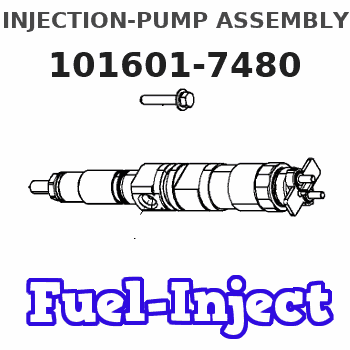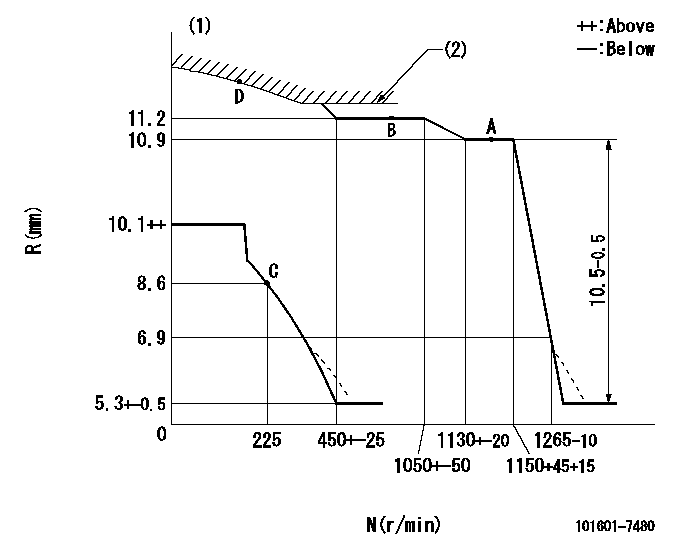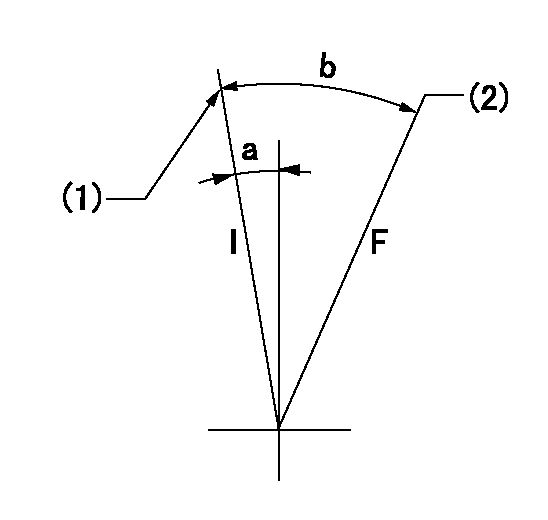Information injection-pump assembly
BOSCH
9 400 610 160
9400610160
ZEXEL
101601-7480
1016017480
ISUZU
1156009453
1156009453

Rating:
Service parts 101601-7480 INJECTION-PUMP ASSEMBLY:
1.
_
7.
COUPLING PLATE
8.
_
9.
_
11.
Nozzle and Holder
1-15300-088-1
12.
Open Pre:MPa(Kqf/cm2)
22.1{225}
15.
NOZZLE SET
Cross reference number
BOSCH
9 400 610 160
9400610160
ZEXEL
101601-7480
1016017480
ISUZU
1156009453
1156009453
Zexel num
Bosch num
Firm num
Name
9 400 610 160
1156009453 ISUZU
INJECTION-PUMP ASSEMBLY
6QA1 * K 14BF PE6AD PE
6QA1 * K 14BF PE6AD PE
Calibration Data:
Adjustment conditions
Test oil
1404 Test oil ISO4113 or {SAEJ967d}
1404 Test oil ISO4113 or {SAEJ967d}
Test oil temperature
degC
40
40
45
Nozzle and nozzle holder
105780-8140
Bosch type code
EF8511/9A
Nozzle
105780-0000
Bosch type code
DN12SD12T
Nozzle holder
105780-2080
Bosch type code
EF8511/9
Opening pressure
MPa
17.2
Opening pressure
kgf/cm2
175
Injection pipe
Outer diameter - inner diameter - length (mm) mm 6-2-600
Outer diameter - inner diameter - length (mm) mm 6-2-600
Overflow valve
131424-0220
Overflow valve opening pressure
kPa
147
113
181
Overflow valve opening pressure
kgf/cm2
1.5
1.15
1.85
Tester oil delivery pressure
kPa
157
157
157
Tester oil delivery pressure
kgf/cm2
1.6
1.6
1.6
Direction of rotation (viewed from drive side)
Right R
Right R
Injection timing adjustment
Direction of rotation (viewed from drive side)
Right R
Right R
Injection order
1-4-2-6-
3-5
Pre-stroke
mm
3.7
3.65
3.75
Beginning of injection position
Drive side NO.1
Drive side NO.1
Difference between angles 1
Cal 1-4 deg. 60 59.5 60.5
Cal 1-4 deg. 60 59.5 60.5
Difference between angles 2
Cyl.1-2 deg. 120 119.5 120.5
Cyl.1-2 deg. 120 119.5 120.5
Difference between angles 3
Cal 1-6 deg. 180 179.5 180.5
Cal 1-6 deg. 180 179.5 180.5
Difference between angles 4
Cal 1-3 deg. 240 239.5 240.5
Cal 1-3 deg. 240 239.5 240.5
Difference between angles 5
Cal 1-5 deg. 300 299.5 300.5
Cal 1-5 deg. 300 299.5 300.5
Injection quantity adjustment
Adjusting point
A
Rack position
10.9
Pump speed
r/min
1150
1150
1150
Average injection quantity
mm3/st.
106.2
104.2
108.2
Max. variation between cylinders
%
0
-4
4
Fixing the lever
*
Injection quantity adjustment_02
Adjusting point
B
Rack position
11.2
Pump speed
r/min
700
700
700
Average injection quantity
mm3/st.
108.1
107.1
109.1
Max. variation between cylinders
%
0
-2
2
Basic
*
Fixing the lever
*
Injection quantity adjustment_03
Adjusting point
C
Rack position
8.6+-0.5
Pump speed
r/min
225
225
225
Average injection quantity
mm3/st.
11.5
9.2
13.8
Max. variation between cylinders
%
0
-13
13
Fixing the rack
*
Injection quantity adjustment_04
Adjusting point
D
Rack position
-
Pump speed
r/min
150
150
150
Each cylinder's injection qty
mm3/st.
140
140
Fixing the lever
*
Remarks
After startup boost setting
After startup boost setting
Timer adjustment
Pump speed
r/min
500
Advance angle
deg.
0.3
Timer adjustment_02
Pump speed
r/min
600
Advance angle
deg.
0.8
0.1
0.8
Timer adjustment_03
Pump speed
r/min
700
Advance angle
deg.
0.8
0.3
1.3
Timer adjustment_04
Pump speed
r/min
900
Advance angle
deg.
2
1.5
2.5
Timer adjustment_05
Pump speed
r/min
1150
Advance angle
deg.
4
3.5
4.5
Remarks
Finish
Finish
Test data Ex:
Governor adjustment

N:Pump speed
R:Rack position (mm)
(1)Beginning of damper spring operation: DL
(2)Excess fuel setting for starting: SXL
----------
DL=6.5+-0.5mm SXL=12.1+-0.1mm
----------
----------
DL=6.5+-0.5mm SXL=12.1+-0.1mm
----------
0000000901

F:Full load
I:Idle
(1)Stopper bolt setting
(2)Attach the return spring to the upper hole and adjust.
----------
----------
a=4deg+-5deg b=21deg+-3deg
----------
----------
a=4deg+-5deg b=21deg+-3deg
Stop lever angle

N:Pump normal
S:Stop the pump.
----------
----------
a=35.5deg+-5deg b=71deg+-5deg
----------
----------
a=35.5deg+-5deg b=71deg+-5deg
Information:
If the vessel cannot continue under its own power, it is recommended that the vessel be towed. The propeller of a vessel being towed will windmill through the water. Propeller rotation causes the propeller shaft to rotate. An extended period of propeller shaft rotation without proper lubrication will damage the marine transmission shaft bearings. If pressurized oil cannot be supplied to the marine transmission shaft bearings during towing, the propeller shaft must be secured to prevent propeller shaft rotation.
Most marine transmissions can be back driven (propeller wind milling with dead engine) under the following conditions, provided that vessel speed does not exceed normal maximum propulsion speed of the vessel. For intermittent back driving, such as:* Sailboat auxiliary (short trips)* Towing purse boats in seining operations1. Start the engine and operate the marine gear in neutral, at normal oil pressure, for a minimum of five minutes. Do this once every 24 hours.2. Maintain the marine transmission oil level the same for back driving as for normal propulsion, or keep level above FULL mark on dipstick.3. Make sure the marine transmission is in neutral while the craft is being towed. For continuous back driving, such as:* Sailboat auxiliary (long trips)* Towing to deliver a boat* Towing home a boat with engine trouble (long trip-more than a day)1. Operate in neutral with oil at normal oil pressure for a minimum of five minutes every 12 hours.2. Fill the marine gear with oil until the oil level touches the input shaft on the engine centerline.3. Make sure the marine transmission is in neutral while the craft is being towed.Securing the Propeller
Reverse wind milling can cause engine damage. The best way to prevent reverse wind milling is to secure the propeller. If possible, lock the propeller shaft to prevent rotation.After the propeller shaft has been secured, have the towing vessel travel at slow speed in order to minimize the wind milling force on the propeller. If the vessel is being towed and the marine transmission is allowed to windmill for long periods, the engine must be started and the marine transmission operated for five minutes every 12 hours to lubricate the propeller shaft bearings.There are several ways of preventing propeller shaft rotation. The correct method depends upon the turning force of the propeller, and the construction of the propeller shaft tunnel. Use the method best suited for the type of installation.Propeller Shaft Wrapping
1. On small vessels, wrap a heavy rope around the propeller shaft. The number of wraps needed will depend upon the mass of the propeller and propeller shaft.2. Secure the rope in the opposite direction of propeller shaft rotation.Securing the Companion Flange
1. Remove one or more bolts from the companion flange coupling. Bolt a chain to the companion flange. Wrap the chain several times around the propeller shaft.2. Secure the loose end of the chain at a right angle to the propeller shaft and in the opposite direction of propeller shaft rotation.